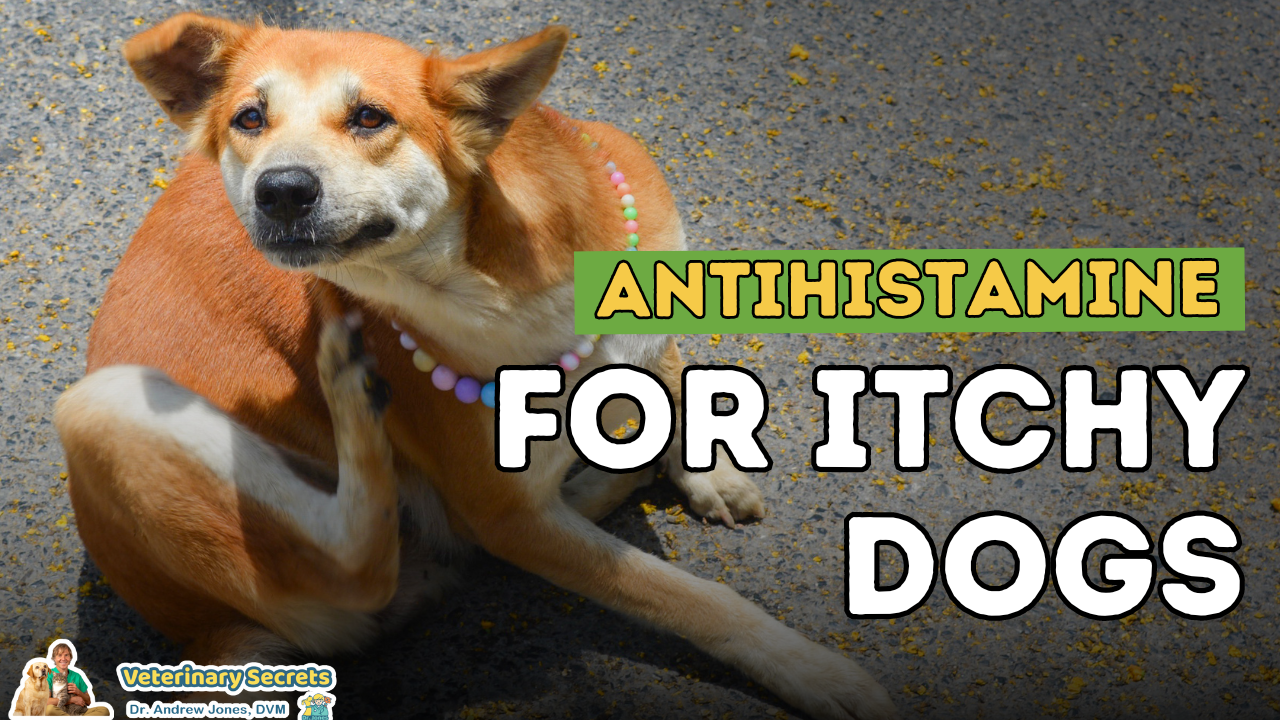Have you ever noticed your furry friend scratching incessantly or showing signs of an allergic reaction? Cetirizine, commonly known by brand names such as Zyrtec and Reactine, could be a solution for your pet’s discomfort. In this article, we’ll delve into what cetirizine is, how it’s administered, potential side effects, and some natural alternatives to consider.
What is Cetirizine?
Cetirizine is an antihistamine used to treat pruritus (itching) associated with atopic dermatitis, urticaria (hives), and insect-bite reactions in cats and dogs. It’s important to note that its use in cats and dogs is ‘off label’ or ‘extra label’, meaning it’s commonly prescribed for conditions not specified in the official labeling. As always, follow your veterinarian’s directions and cautions very carefully when administering off-label medications.
How is Cetirizine Administered?
Cetirizine is given orally, either in the form of a tablet or as an oral syrup. It can be given with or without food, but if your pet shows signs of sickness or vomits after receiving the medication, try giving it with a small amount of food. Typically, the medication takes effect quickly, within 1 to 2 hours, and improvement in your pet’s symptoms should follow.
Missed Doses
If you miss a dose of cetirizine and your pet is receiving it twice a day, give the next dose when it’s time to do so. For once-a-day dosing, give it when you remember and continue at the regular time. Never give your pet two doses at once or give extra doses.
Potential Side Effects
Cetirizine usually doesn’t cause any side effects. However, some dogs may experience vomiting and increased salivation. At high doses, sleepiness has been reported in small dogs and cats. Any severe or worsening side effects should be reported to your veterinarian. This medication typically stops working within 24 hours, but effects can last longer in pets with liver or kidney disease.
Risk Factors
- Do not use the combination product containing pseudoephedrine in dogs and cats.
- Cetirizine should not be used in pets with a hypersensitivity to it or hydroxyzine.
- Use cetirizine with caution in pets with seizure disorders, difficulties urinating, constipation, thyroid problems, prostatic enlargement, heart, kidney, or liver disease, or glaucoma.
Dosage
Standard dog and cat doses are 5mg/10lbs of body weight given once daily. Tablets are typically 10mg, so 1/2 tab for a 10lb dog or cat.
Comparisons and Natural Alternatives
Many dog parents find cetirizine to be the most effective antihistamine for allergy flare-ups, with far fewer side effects than Benadryl. It appears to be a safer over-the-counter antihistamine and is more effective when combined with Essential Fatty Acids (i.e., Krill).
For those looking for a natural option, consider a whole plant extract that combines all parts of the plant for maximum benefit. Many pet parents have found success with this natural alternative.
I wish I had some Cetirizine a few days ago, although I did find some Benadryl that helped. Cetirizine is safer and doesn’t make you drowsy.
Conclusion
Cetirizine can be a valuable tool in managing your pet’s allergies and discomfort. Always consult with your veterinarian before starting any new medication, and closely monitor your pet for any adverse reactions. With the right approach, you can help your furry friend enjoy a more comfortable and itch-free life.





Doc I have 8 year old black Labrador retriever and just in the past year he’s had some skin reaction and is itching as well as chewing his back/tail aera. He has also had some spots on his ears that have scabs we have been treating and they have gotten better, but it looks like it’s now moved to the top of his nose. Ant help you could give or tip would be much appreciated. I hurt when my kids hurt and I just don’t believe that spending more money on the veterans to just guess and throw the kitchen sink at it with no results isn’t manageable anymore. I thank you for your time and love the YT page. Thank you!
Hi Jason, I have a 6 month old Staffy who has the same issues, chewing back/tail area, spots on the ears that looks like dry skin / scabs. Did you find a solution? We cook her food, she’s on pre-pro biotics and Canine Prime which is another supplement and add Omega 3/6 oil to her food.
Nice and thanks for sharing, we also do have an article that helps:
Having an ear infection can be so painful, so can you imagine what it’s like to have recurring ear infections like many of our dogs get? One of the most important ways to help your dog is with regular ear cleaning.
We now have a new Dog Ear Wash made with natural ingredients – it has no alcohol so it will not be irritating or painful.
If you have a dog with an ear issue, I encourage you to try it:
Dr. Jones’ Natural Ear Relief Wash For Dogs
EAR INFECTIONS in DOGS
SIGNS
Your pet keeps shaking his head and scratching at the ears. Often you will see a foul-smelling black, yellow, or brown discharge. The ears may be very red and tender.
* Shaking the head
* Scratching at the ears
* Redness to the ear flap or entrance to the ear canal
* Discharge from the ear canal
* Pain when the ear is touched
* Thickening of the ear canal
* Rubbing the face/ear on the ground or furniture
* Licking the paws excessively (a general sign of an allergy)
* Itching or licking other parts of the body (a general sign of an allergy)
* In severe cases, if the eardrum ruptures, the infection can spread to the middle and inner ear causing symptoms like head tilt, walking abnormally, circling, falling over, or pain when eating or opening the mouth fully.
CAUSES
Ear infections are most typical in dogs. Most ear infections are caused by an underlying allergy. Some are caused by water in the ear after bathing or swimming. Dogs with large floppy ears, such as basset hounds, are prone to infections as their ear canals have poor air circulation, trapping moisture and allowing bacteria and yeast to grow. Dogs with ear infections caused by yeast usually have a black discharge; this is commonly second to an allergy. Dogs with bacterial ear infections often have an organism called staphylococcus; in rare cases a more serious infection is caused by bacteria called pseudomonas.
STEP 1- CLEANING
CLEAN THEM. White vinegar (acetic acid)is very effective at removing debris from the ears and killing the yeast and bacteria responsible for ear infections. *If your dog has red, open wounds, do not use this as it will be painful.*
You need to use a soothing topical first (i.e. olive oil and Vitamin E). Dilute the vinegar with water/green tea (80:20), pick up a syringe from a local pharmacy and put 5 ml of the vinegar solution per 20 lbs of body weight into the affected ear.
Natural Ear Wash:A holistic, alcohol free ear wash is a great option for regular ear cleaning, such as Dr Jones’ Natural Ear Relief Wash [https://shop.veterinarysecrets.com/dr-jones-natural-ear-wash.html/]
STEP 2 – TREAT the infection
Apple Cider Vinegar is NATURALLY antibacterial and antifungal, so will help with most cases of ear infections. I prefer a 80:20 solution of ACV and Warm Water/green tea. Apply 5-10 drops twice daily for 7-10 days
Sweet Almond Oil in combination with lavender oil is beneficial when the ears are very inflamed, and the ACV will be irritating and painful. 2 tablespoons of almond oil, 10 drops of lavender oil
BUROW’S SOLUTION.This is one that I discuss for use in hot spots, but it can also be used for ear infections and ear cleaning. It is a solution of aluminum acetate in water. It is used as an astringent wet dressing to relieve inflammatory conditions of the skin, such as swelling, allergies, and bruises. Burow’s solution has antibacterial effects, and will inhibit the growth of bacteria commonly found in ear infections. Apply five to six drops in both ears, cleaning twice daily.
ANTI-YEAST MEDS.Medication for yeast in people, will often work in dogs. If your dog has black waxy debris, the ears smell ‘sweet’, then it is likely a yeast ear infection. Canesten and Monistat both work well. Apply twice daily for 7-10 days.
New DIY Remedy includes 2 OTC medications that make up most of the common Veterinary Ear medications for animals:
1. Canesten (the drug name Clotrimazole). This is the most common antifungal used in veterinary medicine
2. 1% Hydrocortisone (Corticosteroids). These are in virtually EVERY Dog and Cat topical skin medications to decrease inflammation in the ear/on the skin
Directions: 1 teaspoon of Canesten
1 teaspoon of 1% Cortisone
Mix evenly in a bowl and you are left with a white cream that looks like cake icing. For skin allergies:Apply topically to the affected skin twice daily for 7-14 days. For ear infections: apply 1/4 inch to the end of your finger. Seat it into the base of your pet’s ear. Massage ear base to work it down the ear canal. Do this twice daily for 5 days for Ear Yeast infections.
STEP 3 – TREAT the UNDERLYING CAUSE (ALLERGIES)
BIOFLAVONOIDS.These are the wonderful group of structures found in the pigment of fruits and vegetables. Quercetin has been effective for people with allergies and may be effective in dogs. Our new whole plant extract quercetin supplement, Dr Jones’ BIOAVAILABLE Quercetin has been helping many dogs
ANTIHISTAMINES.Benadryl (diphenhydramine) is the most commonly used antihistamine. It is given at a dose of 1 mg per pound of body weight, 2-3 times a day. A newer antihistamine, Ceterazine (Zyrtec) has fewer side effects, and can be given once daily. It is dosed at 5mg/10lbs daily. It often takes 14 days of using these to see if they are helping.
Herbal Antihistamines: Stinging Nettle is a proven natural antihistamine, and very safe for our pets. NETTLE dose of 1 teaspoon/10lbs daily.
95% Curcumin.At higher levels curcumin stimulates the adrenal glands to secrete cortisone. The standard oral dose of 95% curcuminoids is 100mg/10lbs daily- Our High Absorption 95% Curcumin is dosed at 250mg/50lbs once-twice daily
The omega 3 fatty acids in Krill Oil are anti-inflammatory and can help your dog with recurring ear infections. Krill oil dose of 500mg/20lbs daily. Fish Oil dose is 1000mg/20lbs daily. Our Omega 3 supplement, Dr Jones’ ULTIMATE Omega 3 Formula for Dogs and Cats is a good option.